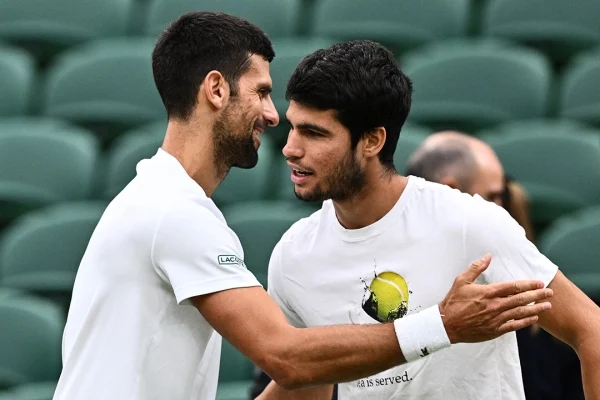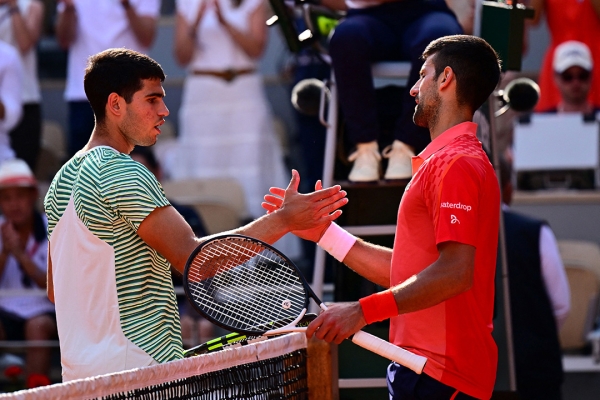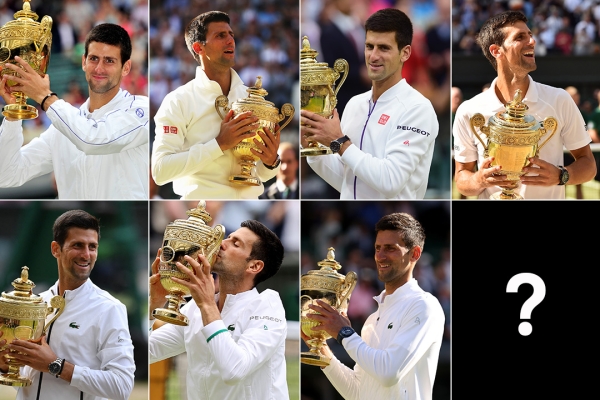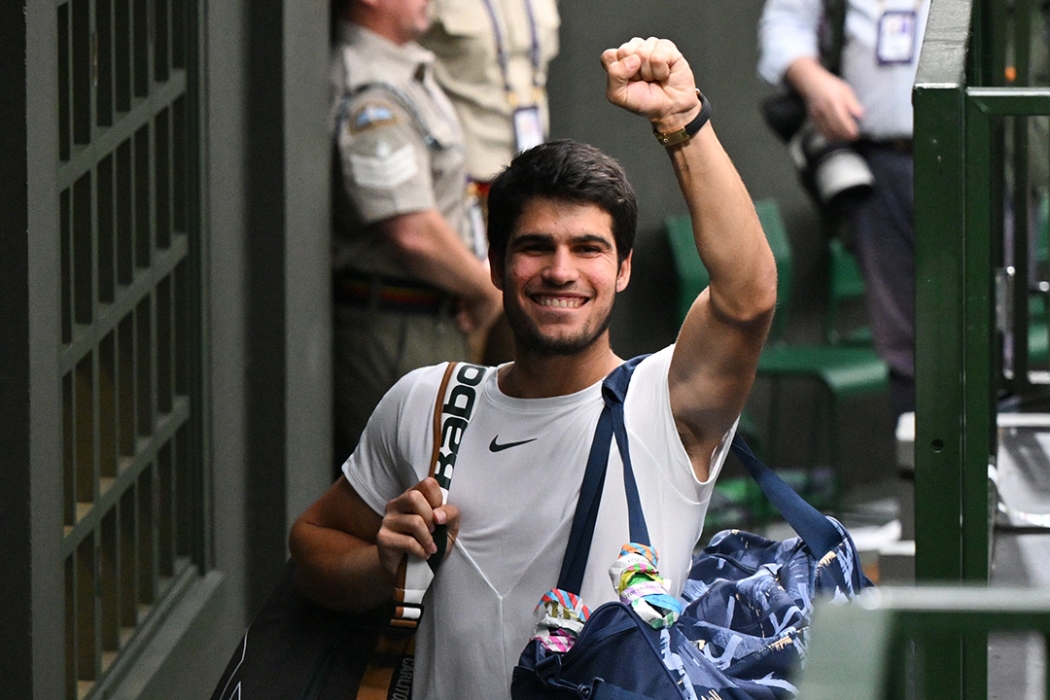When Carlos Alcaraz completed a straight-sets semifinal win over Daniil Medvedev on Friday, he locked in the showdown that almost everyone had craved since the start of the tournament.
On Sunday, he and Novak Djokovic will clash in a final between the tournament’s top two seeds. The winner will walk away as the world No.1.
Wimbledon tweeted a graphic promoting the match-up, with the caption: “Sunday 16 July. Centre Court. No.1 vs No.2.”
At the time of writing, it is already approaching two million views.
It is a dream Grand Slam final showdown set to captivate the tennis world. Djokovic, who has played in many more of these Wimbledon finals than his young rival, understands it has the capacity to impact even further.
“It's an ultimate showdown,” said Djokovic, who beat Jannik Sinner in straight sets in the first of Friday's semifinals.
RELATED: Will it be number eight for the great Novak Djokovic at Wimbledon?
“Everything comes down to one match. All eyes of the tennis and sports world will be directed on this Sunday Wimbledon's final. It's probably the most watched tennis match globally. I look forward to it.
“This is probably the most anticipated finals I guess from the beginning of the tournament, from most of the people. Alcaraz, myself.
“Judging by the performances that we have seen from all the players, I think this is probably the best finals that we could have.”

It is fascinating just how many high notes this match-up hits, when you analyse exactly why it generates and drives such interest.
Firstly, it’s their respective ages. Alcaraz, 20, takes on 36-year-old Djokovic in a major final featuring the third-largest age gap between men in the Open era.
It was only larger when Jimmy Connors beat Ken Rosewall – a player nearly 18 years his senior – in the 1974 Wimbledon and US Open finals.
That was almost 50 years ago.
This stark difference in age supports this being the ultimate “intergenerational clash”, a theme developing for years in men’s tennis.
The ‘Big Three’ have collected the majority of Grand Slam titles as successive waves of young talent have risen in the game. Yet Roger Federer’s retirement and Rafael Nadal’s long-term injury have meant Djokovic is for now the lone representative of this group. Alcaraz, meanwhile, has become the most likely successor from the latest group of rising stars – the others being Sinner and Holger Rune – and appears Djokovic’s biggest threat in the five-set format at Slams.
It’s here we should mention the plotline of avenging defeat. Alcaraz was indeed threatening Djokovic the last time they played at a major, just one month ago at Roland Garros. He’d snatched a high-intensity second set to level the match – only to be halted by severe cramps.
ALCARAZ: "I have never felt tension that I did in that match"
Alcaraz admitted these cramps were brought on by the incredible tension and nerves associated with facing Djokovic for the first time on such a big stage. Perhaps not helping was the intense anticipation from everyone – himself included – when that semifinal was set.

It was just their second meeting, more than a year after their last, and their first ever at a Grand Slam tournament.
Its scarcity is another reason this match-up is so compelling.
In men’s tennis, it is uncommon for the world’s two best players to play so infrequently. For much of the past year, Alcaraz and Djokovic have traded the world No.1 ranking, and between them, they hold all four major titles.
ALCARAZ ARRIVES: US Open champion and youngest ever world No.1
It’s a case of ‘irresistible force versus immovable object’ – another wonderful element at play in this match-up.
Alcaraz, the irresistible force, is undefeated on grass this year. He won the Queen’s Club title and carries an 11-match winning streak into Sunday’s final against Djokovic, the immovable object. That’s because nobody has defeated Djokovic on Centre Court for a decade; he also owns a 34-match winning streak at Wimbledon, having not lost a completed match there since 2016.

If that’s not enough, there is all of the history, records and “bragging rights” on the line when Djokovic and Alcaraz play.
Appearing in an Open era-record 35th major final, Djokovic could equal Roger Federer’s record of eight Wimbledon titles, and Margaret Court’s all-time record of 24 major singles titles.
Should Alcaraz prevail, he would become a multiple major champion – joining a select few to do so under the age of 21 – with Slam titles on different surfaces, while retaining the top ranking.
“If I win, it could be amazing for me. Not only win a Wimbledon title, but do it against Novak would be super special,” Alcaraz said.
“I always say if you want to be the best, you have to beat the best. Novak is one of them. Would be great if I'll do it.”
While Alcaraz is, according to the computer, ranked No.1, few would argue if you said Djokovic is the best tennis player in the world. And there’s a growing consensus the Serb’s numbers, records and milestones prove his case for the title of Greatest of All Time.
“I think the bottom line is that we all want more attention for our sport,” Djokovic told Tennis Channel.
“The more people in (the) sports world talk about, whether it’s my records, or anybody else’s records, on men’s or women’s side, the better it is. The more GOAT debates, the better it is.
“Because at the end of the day, we want more traction, we want more attention to this sport, that is a very global sport, it’s a beautiful sport.”
Sunday’s final could go some way to delivering on that traction and attention.
It features a player in Djokovic who has long been open about his quest for greatness, and Alcaraz, who admitted similar earlier this year in an essay for Eurosport.
Motivation will not be in short supply when they battle on Sunday.
“He's young. He's hungry,” Djokovic said of Alcaraz.
“I'm hungry, too, so let's have a feast.”

